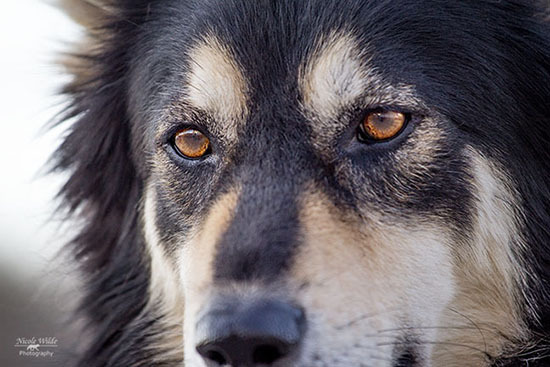When you bring a dog home from a shelter or adopt one from a rescue, you're doing a noble thing. You're taking a dog whose days might be numbered, and giving him a new lease on life. Perhaps the dog immediately takes to your family, fits right in, and never displays major behavioral problems. Good for you! But, unfortunately, that's not the way it goes for everyone. Many of us who rescue or adopt dogs have adopted challenges along with them that must be worked through. It's not something you'll see on those tug-at-your-heartstrings commercials, but it's the truth.
In addition to having been a canine behavior specialist for close to the last quarter century, I've always been involved in rescue. There have been the dogs I rescued personally, the ones I worked with in Los Angeles city shelters, and the wolves and wolfdogs at the rescue center I co-ran--three of whom I ended up bringing home. The road has not always been an easy one. Over the years, as I've dealt with various behavior issues with my own dogs, I've discussed them openly in my books and blogs. Dog owners and even other trainers seem to appreciate hearing about the struggles and problem solving, rather than just reading about how wonderful things are. And so, in the spirit of honest sharing, I offer a few excerpts from my latest book, Hit by a Flying Wolf: True Tales of Rescue, Rehabilitation and Real Life with Wolves and Dogs.
My husband and I rescued Bodhi, a malamute mix, and Sierra, a husky mix, from separate shelters. Not only did they each have behavior problems--and believe me, Bodhi had enough for five dogs--but at the start, there were conflicts between them:
There were periods when I'd have a few minutes or even a few hours where I felt more optimistic about Bodhi--and then something else would happen. Two weeks after we brought him home, I was taking a much-needed break from the book I was writing about separation anxiety. I was lying on the living room couch reading, with a box of peanut butter crackers wedged between my body and the back of the couch. Sierra came walking up through the narrow corridor formed by the couch and the coffee table. She sniffed the air and then the couch. I patiently explained that although peanut butter was indeed one of the world's finest inventions, the crackers weren't for her. Just then Bodhi approached from the opposite direction. Now the dogs were nose to nose in a very small space, with me in the middle. Before you could say "Not good," a snarkfest broke out. Jaws clacked and snarls filled the air as the dogs lunged at each other. I wedged the book between them (now, there's one advantage of a solid book over a Kindle) and simultaneously sprang up, employing reflexes I didn't know I still possessed. Sierra seemed scared, while Bodhi just looked puzzled. I calmed the dogs down, put the crackers away, and made a mental note that the Fear of Clacking Jaws Diet could be quite the effective deterrent against late afternoon couch snacking.
Dogs aren't the only ones who come with issues. For years I co-ran Villalobos Rescue Center with my friend Tia Torres--this was years before Pit Bulls & Parolees came along, when the center was dedicated to rescuing only wolves and wolfdogs. Amongst other duties, I went out on house calls to assist owners so they could keep their animals, transported wolves to the rescue, and did socialization and training with the residents. Then, for reasons explained in the book, I brought three of them home to live with me. As you might imagine, wolves aren't exactly like dogs, and they presented some serious challenges. That they hadn't had the best start in life didn't make things any easier, either. Like so many rescue dogs, Heyoka, a mostly-wolf, had an intense fear of people; it took a long time for me to even be able to touch him. As you might imagine, veterinary visits weren't the easiest....
This particular veterinary office had seen a lot of the rescue's animals over the years. None had ever fazed the burly gang members-turned-vet-techs. These guys had wrangled huge Pit Bulls, wolves, and everything in between. But they hadn't met Heyoka. C.C. and I watched from the waiting room as a dark-haired, twenty-something tech strode confidently toward the holding area in the back. Ten minutes later, he emerged covered
in a thin film of sweat, and called for another tech to assist him. The two disappeared. Fifteen minutes later they both reappeared looking sweaty, disheveled, and with a distinct deficiency in the swagger department. "We need the catch pole," one panted to a third tech, who looked at them and asked, "You wrestling alligators back there or what?" Three techs and thirty minutes later, Heyoka was safely back in the crate.
I don't mean to give the impression that life with the wolves and dogs has been nothing but difficulties. The love, trust, moments of bonding and affection, and near-magical turnarounds in behavior and spirit are more than worth all of the time and effort. My goal in writing Hit by a Flying Wolf is, beyond simply offering what is hopefully a fascinating read, to inspire owners to not only feel better about the struggles they're having with their own dogs, but to hang in there and keep trying, even when behavior problems cause disruption, frustration, and challenges. Sometimes true change can take months, or even years. But when we take animals into our homes and families, in the end, the effort is always worthwhile. Just ask Bodhi, the dog I thought I'd never bond with; he's lying quietly by my side as I type this, and I absolutely love him. That's the truth about rescue.
Nicole Wilde is a canine behavior specialist and author. Visit her website www.nicolewilde.com.
Follow Nicole Wilde on Facebook.

